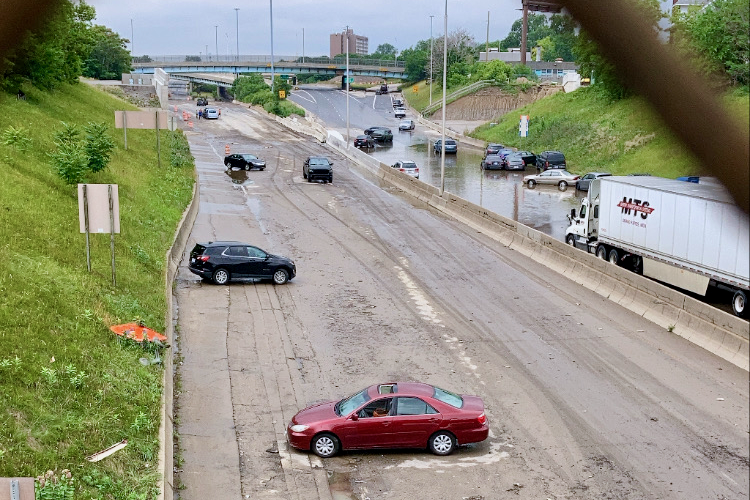Overview:
-Michigan's extreme weather events like ice storms, flooding, and tornadoes highlight need for government services, writes Sierra Club's Elayne Coleman.
-"Michigan stands in a unique position of peril" as state lawmakers push for deep cuts in addition to Trump administration actions, she says.
-"These so-called once-in-a-lifetime storms are practically becoming part of the seasonal routine in Michigan as climate change impacts our weather patterns."
Michigan weather is always unpredictable, but as this spring draws to a close it’s clear that extreme weather and climate change are at our doorstep.
Several bouts of extreme weather rocked the entire state of Michigan starting in March, with extraordinary ice storms knocking out power Up North, torrential downpours causing flooding across metro Detroit, and deadly tornadoes ripping through the state.
The continuing fallout from these storms, which have claimed the lives of at least four Michigan residents, should serve as an urgent warning against national and state-level attacks on essential government agencies and employees. Workers from the DNR, FEMA, and EGLE have worked tirelessly throughout this spring to mitigate storm damage and keep us safe, and their work is likely to continue as we head into the hot summer months.
Environmental activists across the country are rallying against the Trump administration’s dirty budget bill, which seeks to gut environmental programs and protections to fund tax breaks for billionaires. But Michigan stands in a unique position of peril as our state lawmakers also push for deep cuts to environmental and emergency response programs – leaving us without a backup plan if Trump gets his way.
Extreme weather events like the ones we have seen in Michigan this spring are no longer a fluke. In recent years, relentless rain storms have led to repeated catastrophic flooding in Southeast Michigan, deadly tornadoes have flattened West Michigan communities, and extreme temperatures all over the state are overloading our energy infrastructure, leading to dangerous and widespread power outages.
These so-called once-in-a-lifetime storms are practically becoming part of the seasonal routine in Michigan as climate change impacts our weather patterns.
Just ask the residents of Dearborn Heights living near Ecorse Creek who have experienced frequent flooding. FEMA spent $3.18 million to buy out 18 homes in the area in 2024, and after further flooding in April of this year, Mayor Bill Bazzi reportedly said the city is seeking more FEMA funds to purchase additional homes.
The Trump administration is withholding some $56 million in promised FEMA disaster reimbursements for the state, a portion of which were dedicated to previous flooding damage in 2021.
It’s not just rain, either. Michigan is experiencing more deadly tornadoes. Our state’s tornado count hit a 15-year high last week after twisters touched down in Southeast Michigan.
In nearly every instance, including these most recent storms, a state of emergency was declared and aid rushed to people impacted. The devastation was blunted and unknowable amounts of lives were saved by essential government agencies and their employees.
MORE PLANET DETROIT VOICES
VOICES: Pope Francis’ climate legacy: Can Pope Leo XIV carry the torch?
As Pope Leo XIV steps into his role, young people are eager to see if he will continue Pope Francis’ legacy on climate action, writes the Rev. Gary R. Wright, parish priest at Saints Peter and Paul Jesuit Church in Detroit
VOICES: Michigan is the first state to require water filters in schools. Let’s make sure it’s done right.
Michigan leads the nation by mandating lead-removing filters in school drinking water, empowering families to scrutinize their school’s Drinking Water Management Plan.
VOICES: Are Great Lakes protections drowning in deregulation?
In Detroit, federal environmental cuts and deregulation threaten the Great Lakes ecosystem, with layoffs at the Great Lakes Fishery Commission and the U.S. Fish and Wildlife Service, and weakened environmental protections raising concerns about long-term impacts.
As these deadly weather events become more frequent and federal resources are clawed back by the Trump administration, Michigan state lawmakers should be aiming to keep people safe by pouring more funding into our emergency response agencies and our environmental agencies combating pollution and climate change.
Instead, state House Republicans are threatening to slash the state budget, essentially defunding Health and Human Services, the Department of Natural Resources, and the Department of Environment, Great Lakes, and Energy.
This spring would have looked very different without these agencies.
In the northern Lower Peninsula and Upper Peninsula, where Gov. Gretchen Whitmer declared a state of emergency, government-funded employees have been working around the clock to clean up the damage from April’s ice storm. In Grand Rapids, EGLE monitored efforts to assess and contain an oil spill caused by downed transformers.
The MDHHS, also on the House Republicans’ chopping block, plays a key role in all of these emergency responses deployed by the Governor.
It is not a question of if this will happen again, but when. The next time a storm rips through our neighborhood, a flood displaces us from our home, or a power outage leaves us vulnerable to extreme temperatures, there may not be anyone left to answer the call for help.
It is only in the absence of our critical environmental government agencies that we may see the true human toll of climate change.
Planet Detroit’s Voices column includes opinion pieces from our community of partners and readers. These pieces express the voices of the authors and not necessarily those of the publication.





